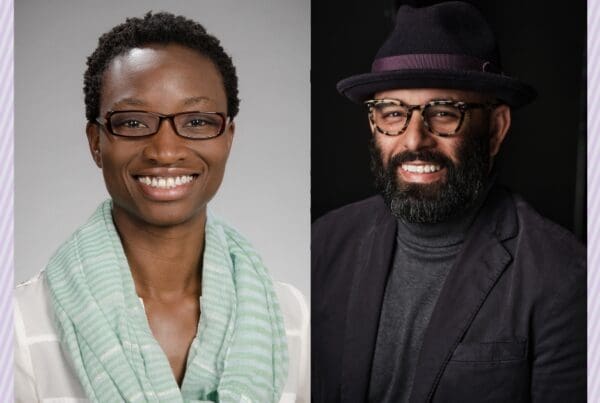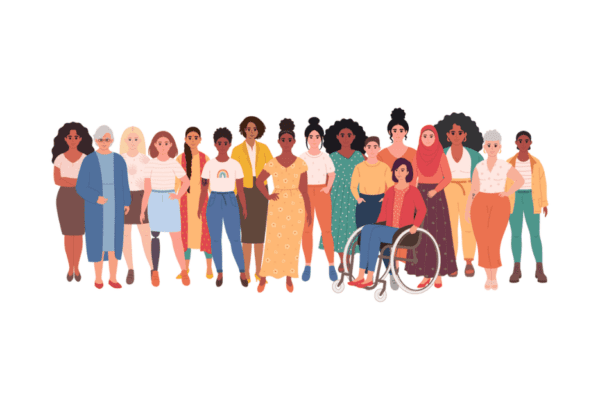This year for Asian, Native Hawaiian and Pacific Islander (ANHPI) Heritage Month, the theme is “Advancing Leaders Through Opportunity.” We asked some of our ANHPI colleagues what their heritage and cultures mean to them and how UW Medicine can create more opportunities for their communities in our workforce.
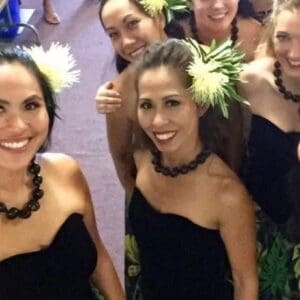
Augie Eddings
Augie Eddings, she/her, Panel Navigator, Population Health, UW Medicine Primary Care
“I’m from Hawaii and I am a mix of many nationalities, predominately Filipino and Portuguese. I grew up with mostly Hawaiian culture instilled in me. I was brought up on love and respect of the land, the ocean and all that is in it. I moved here to the mainland with my son and since then have had two daughters. I brought them up on Hawaiian culture and with dance, food, language and living your life with the Law of Aloha, which means many things, but mostly to appreciate everything, pay homage to nature, stay rooted in your ‘ohana (family) because that is everything and most of all, be kind and stay humble. My heritage is what grounds me. It’s what drives me, and it is what brings me back to my center and a peaceful place when things become too chaotic. When life gets stressful, I put on my favorite Hawaiian songs, and I dance hula. It’s my happy place. It is what makes me unique and the person that I am today. I’m proud of my people, where I came from and what our story is.”
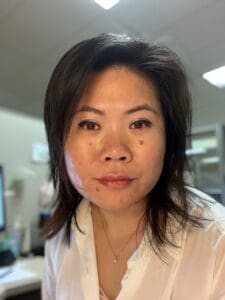
Danna Lamont
Danna Lamont, she/her, ARNP Lead, UW Medicine Post-Acute Care Service
“Sharing food is such an important part of my Chinese culture and many others around the world. I have found that it is such an easy entry point to learn about my own culture and those of others. Food is the way I have helped my kids to learn about their Chinese heritage. We like to make dumplings together — this is a family tradition because dumplings signify hope, wealth and prosperity. It is thought that if a family does this together, we build that together and it’s why many families choose to make this around the holidays like Lunar New Year. For our family, I hope to pass this on as a tradition – spending time to make food that weaves our interconnectedness.”
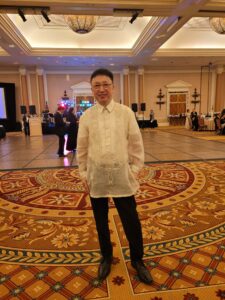
Eduardo Romualdo Munoz
Eduardo Romualdo Munoz, PA-C, he/him, Sexual Health Clinic at Harborview
“Most Asians and Pacific Islanders graduate with a college or doctorate degree yet some of us have difficulty getting a job based on what we studied. I myself graduated from medical school from a university in the Philippines, luckily in the 1980s when you could apply for a physician assistant (PA) license in the U.S., but that was taken away in the ’90s. Recently the state of Washington legislature is trying to reintroduce a bill to allow foreign medical graduates to apply for a PA license due to a shortage of medical providers, especially in rural Washington. I am one of the last providers to be grandfathered to be at this position and am about to retire by the end of this year. There are about three of us left in this state. There are others I know at work who have degrees but who don’t use them in their jobs. Identifying these individuals and giving them a chance to use their talent in a position related to what they do may be beneficial for the university.”
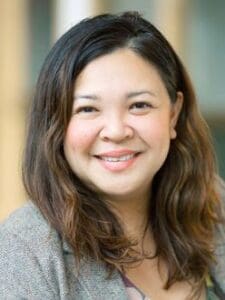
Elaine Acacio
Elaine Acacio, MBA, she/her, Director of Equity, Diversity and Inclusion, UW Medical Center
“Because the ANHPI diaspora is large, there is a misconception that there is sufficient representation and there is no need for additional efforts to grow our pipeline, but that is not accurate. It would be great to see robust efforts in creating viable pathways to leadership for staff and providers, especially within the Southeast Asian, Native Hawaiian and Pacific Islander populations where we have less representation within the ANHPI umbrella. Affinity-based career programming and mentorship, visibility and face time in front of other leaders, and creating welcoming communities of belonging are just a few things that come to mind. Building leaders, particularly within immigrant or traditionally marginalized groups, is mutually beneficial for UW Medicine because of the diversity in experience, practice and lived experiences that we can all learn from.”
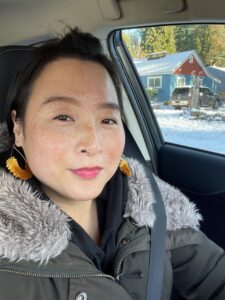
Jacqueline Kim
Jacqueline Kim, MSW, LICSW, CMAC, she/her, Director of Social Work at Harborview
“Food. It is all about the food. Meeting with friends? Must have food. Having a little casual get-together? Food. So much food and eating involved. You see the Korean movies and shows, you will see that there is a lot of slurping, mouths full and no shame in the eating game. All my favorite memories and traditions are tied to food. Rice Cake Soup (dduk guk) for New Year’s, Korean marinated meats for birthdays (galbi and galbi jjim) and lots of noodles to symbolize long life. No meal is complete without some kimchi (spicy fermented cabbage or radish) and other delicious side dishes (banchan). Some of my fondest memories are sitting around a very large metal basin filled with dumpling (mandu) filling and making hundreds of dumplings with my grandmother as she told us stories. When I cook, it ties me back to my grandmother and her mother and her mother before her, etc. with these timeless and classic comfort foods.”
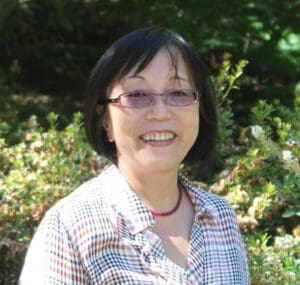
Jeniffer Huong
Jeniffer Huong, she/her, Caseworker Cultural Mediator, Interpreter Services at Harborview
“I am a Chinese-Khmer woman, born and raised in Cambodia. I grew up in a bicultural home. I attended Khmer schools. I am a Buddhist and I attend a Khmer Buddhist temple. My journey to America came after the fall of the Khmer Rouge. My transition from refugee camp to the U.S. was a little harsh. There was tremendous culture shock and cultural barriers. I had to learn a new language, adapt to a new culture and learn to be independent. As I am getting older and looking back on all the accomplishments I have achieved, I feel proud of myself for how far I came, and I know that my journey will continue to face barriers and challenges.”
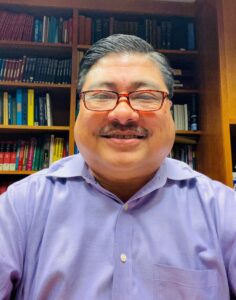
Joe Meno
Joe Meno, MBA, he/him, Vice Chair, Finance & Administration, Department of Urology, UW School of Medicine
“This year’s ANHPI theme of ‘Advancing Leaders Through Opportunity’ really resonates with me. Moving to Seattle from Guam was quite a culture shock. I had to navigate everything from being an 18-year-old fresh out of high school in a ‘different country’ to living in a big city and going through college. After graduating, I was fortunate to land a job in the UW School of Medicine, and I am most thankful for the great mentors I have had along the way. These mentors took great interest in my professional development and career growth. Indeed, I am a product of my efforts, heritage and the outstanding mentorship I received. Living on an island like Guam demands that people be more resourceful to achieve with the available resources. Yet, these and other laudable traits such as self-reliance may hinder them from achieving further success. So, I was delighted when the School of Medicine created a formal mentorship program three years ago. I am a member of the program’s panel of mentors, and I also benefit from the program as a mentee. UW Medicine has a tremendous opportunity to create a similar mentorship program that invests in the unique talents of Asian and Pacific Islanders by helping them develop skills needed to navigate challenges in the workplace and building them into confident leaders. The program can draw from the exceptional and diverse leadership that exists within UW Medicine.”
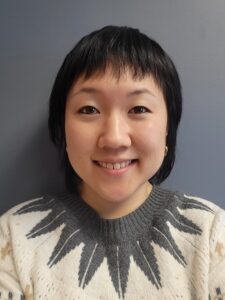
Liann Yamashita
Liann Yamashita, she/her, EDI Trainer at Harborview
“I’m half-Japanese, half-Korean and grew up in Hawaii where there is a very large and diverse Asian, Native Hawaiian, and Pacific Islander population. In the part of Hawaii where I grew up there was a large local Japanese population, and in general, Japanese culture has a lot of influence in Hawaii (for instance, people all throughout Hawaii refer to ‘soy sauce’ using the Japanese word ‘shoyu’). However, there weren’t many Korean people in my hometown, and I think it made my mom who immigrated from South Korea feel rather lonely and isolated. Unlike some other Asian Americans who grow up in the continental U.S., I grew up looking like the people around me and seeing part of my heritage reflected in my environment. And at the same time, I had this strange experience of having a significant part of my heritage be viewed as foreign or unusual to folks in my hometown. As a result, I feel kind of like my heritage represents a level of ambiguity where on one hand, I don’t quite fit in with any particular community, but at the same time I feel like it means I can be whoever I want to be.”
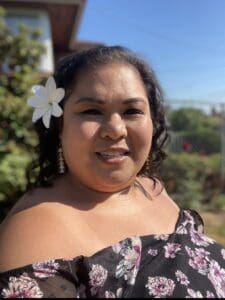
Lourdes Ballena
Lourdes Ballena, she/her, Lead Medical Assistant for Dermatology at UW Medical Center – Roosevelt
“Being a Native Hawaiian/Filipino woman in society today, it is important to me to continue to perpetuate our culture and teach others our real history. It is important for people like me in the medical field to be recognized for our hard work and compassion in the community. My favorite cultural traditions are spending time with ‘ohana (family) and the food. Teaching our keiki how to prepare and cook traditional dishes so they can continue to pass it down to their keiki. Going to festivals and watching hula performances. Seeing the emotions portrayed in the dancer’s movements to help tell the story and history of song and the creation of our island home.”
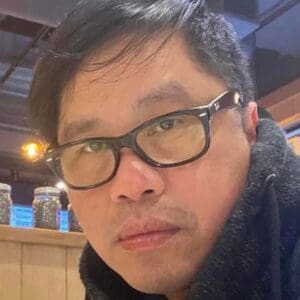
Rodrigo Hiyas
Rodrigo Hiyas, he/him, Licensed Surgical Technologist, Operating Room, UW Medical Center
“My Filipino heritage is very important to me; it is in my system, and I want to preserve it. My favorite cultural celebrations are ‘Simbang Gabi,’ a nightly church mass celebrating the coming of Jesus nine nights before Christmas, and ‘Pista sa Nayon,’ a two-day annual celebration in honor of a Patron Saint, where people living in a certain city or town or barangay have big food preparation for their guests and food is served all day. Part of the celebration is multiple entertainments every night for at least two weeks, and the big event happens on the very date of the Fiesta/Pista celebration.”
Editor’s note: Responses were lightly edited for length, clarity and style. Any information or opinions shared in this article are personal views, and do not represent those of the University of Washington or UW Medicine in any way, shape or form.

